Summary
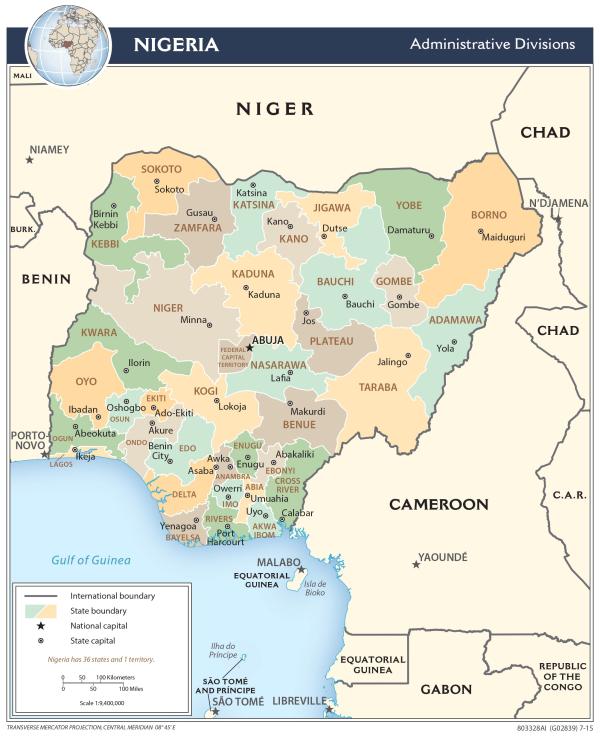
Map of Nigeria
Nigeria, on the east coast of Africa, is a federal republic with a mixed presidential-parliamentary system. The country has had democratically elected governments since 1999 but has struggled to overcome past colonial and dictatorial governance as well as extremist violence by groups seeking to impose a religious state.
Nigeria has been inhabited since at least the 14th century BCE and peopled by many ethnic groups. Several major kingdoms ruled before its southern and northern territories came under British colonial control starting in the early 19th century. After gaining independence in 1960, Nigeria had elected governments for six years before experiencing more than three decades of political instability and military dictatorship.
In 1999, Nigeria returned to elected civilian government. It has had continuous civilian rule since. Yet, elections were so marred by fraud, abuse and chaotic conditions that Freedom House designated Nigeria an electoral democracy only in 2015, when presidential and parliamentary elections resulted in the first peaceful transfer of civilian power among major political parties since independence. The country faces an array of problems, including increasing poverty, corruption and ongoing terrorist violence.
Nigeria is a federal republic with a mixed presidential-parliamentary system. The country has had democratically elected governments since 1999 but has struggled to overcome past colonial and dictatorial governance as well as extremist violence by groups seeking to impose a religious state.
Nigeria has around 250 ethnic groups. The largest are the Hausa in the north, the Igbo in the southeast and the Yoruba in central and southwest regions. By religious affiliation, the population is 50 percent Muslim, 40 percent Christian and 10 percent followers of indigenous beliefs. While Muslims live mostly in the north and Christians mostly in the south, every state has a mixed religious population. Nigeria’s constitution guarantees religious freedom, but twelve northern states adopted Sharia law, causing tensions with non-Muslims.
Nigeria is Africa's 14th-largest country by area and its most populous, with about 225 million inhabitants. The International Monetary Fund projects Nigeria’s 2024 nominal GDP at $253 billion. Its current rank, 54th in the world, is a significant drop from 21st in 2015. Nominal GDP per capita income also dropped to 167th in the world ($1,110 per annum) down from 125th ($2,752), mostly due to high inflation following the Covid-19 pandemic.
History
Early Kingdoms to British Colonization
The earliest record of human habitation in the territory of Nigeria dates to 13,000 BCE. Over time, it became home to many ethnic and language groups. A variety of city-states emerged in the first millennium CE and ruled for centuries: Hausa states in the north; the Kanem-Bornu Empire in the northeast; and Yoruba kingdoms in the southwest. In the southeast, Igbo communities developed a decentralized, village-based political system.
Southern states practiced local or regional polytheistic religions, with leaders or kings often serving as high priests. In the north, Islam spread in the 11th century CE and came under the influence of the Kanem-Bornu, Mali and Songhai Empires.
Southern states practiced local or regional polytheistic religions, with leaders or kings often serving as high priests. In the north, Islam spread in the 11th century CE and came under the influence of the Kanem-Bornu, Mali and Songhai Empires to the north and west of modern Nigeria.
The arrival of the Portuguese in the 15th century, followed by other Europeans, greatly increased the slave trade in West Africa. The Oyo kingdom and the Igbo Aro Confederacy were significant slave-exporting states dominating southern Nigeria until the 19th century.
British Colonization to Independence
The collapse of the Oyo kingdom, which held sway over Yorubaland until the late 18th century, allowed Great Britain to expand trade in the region as well as begin to end the Transatlantic slave trade after having participated in it for centuries. (In 1807, the British parliament outlawed the slave trade and empowered the Royal Navy to enforce the prohibition.)
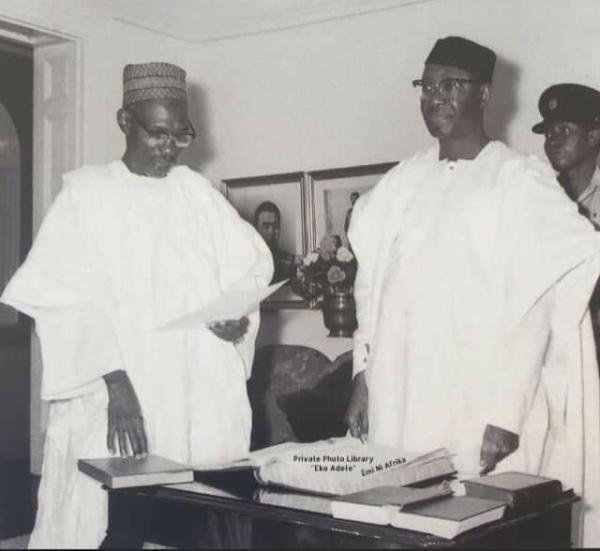
In the process leading to independence, the first black Governor General of Nigeria, Nnamdi Azikiwe, swears in Abubakar Tafawa Balewa (right) as prime minister. Azikiwe was later elected Nigeria’s first president in 1963. Public Domain.
The British annexed Lagos in 1861. European powers, parceling African territories in the “race for empire,” recognized Britain's claims to southern Nigeria at the 1885 Congress of Berlin. Initially, the Royal Niger Company was granted a charter to secure a trade monopoly along the Niger River. The company was replaced in 1900 by protectorates that also expanded British control over northern Muslim states. In 1914, the entire territory was united in the Colony and Protectorate of Nigeria and placed under a British governor.
Demands for self-governance increased after World War I and the larger decolonization movement throughout Africa gained momentum after World War II. Under both domestic and international pressure, the United Kingdom gradually yielded power in all of its colonies, including Nigeria. Initially, the UK granted regional self-governance and nationwide elections were held first in 1959. Britain recognized Nigerian independence on October 1, 1960 within the British Commonwealth and appointed the first Nigerian governor-general.
The First Republic
Nigeria's first constitution established a parliamentary democracy with a bicameral legislature, which selected a prime minister as head of government. In 1963, an amended constitution replaced a ceremonial governor general with a president as head of state.
Nigeria's first constitution established a parliamentary democracy with a bicameral legislature. . . . In 1963, an amended constitution replaced a ceremonial governor general with a president as head of state.
Three main political parties emerged: the Northern People's Congress (NPC) representing the predominantly Muslim Hausa and Fulani regions; the National Council of Nigerian Citizens (NCNC) representing the Catholic Igbo population in the southeast; and the Action Group (AG), a left-leaning party based mainly in the Yoruba-dominated southwest.
The northern-based NPC and Igbo-based NCNC formed the first post-independence government, putting the Yoruba-dominated AG in opposition. Elections in 1964-65 saw a new alliance of the northern NPC and a new Yoruba-based party, the Nigerian National Democratic Party (NNDP). Riots took place due to widespread voting fraud resulting in hundreds of deaths.
Dictatorship and the Biafra Tragedy
In early 1966, ethnic Igbo military officers overthrew the NPC-NNDP government, only to be replaced several months later when northern military officers staged their own coup. They named Lieutenant Colonel Yakubu Gowon to lead the government.
In the north, thousands of Igbo were massacred and many fled to the Eastern Region in the south. Muslims in the south faced retaliatory violence and fled to the north. Colonel Gowon tried to thwart support for an independent republic among Igbo communities by replacing the four administrative regions with a new system of 12 states.
The Igbo military leader of the oil-rich Eastern Region declared independence for the Republic of Biafra in May 1967. Federal authorities seized the Eastern Region’s oil producing area in the Niger Delta and blockaded the territory. The Republic of Biafra gained scant international recognition. Federal forces eventually defeated Biafran resistance in early 1970 and re-absorbed the territory, but not before one million people died from famine, disease and combat — among the post-war period's worst humanitarian disasters.
30 Years of Instability and Dictatorship
Nigeria then experienced a period of more than 30 years of mostly military rule, intermixed with attempts to transition back to democracy.
Nigeria then experienced a period of more than 30 years of mostly military rule, intermixed with attempts to transition back to democracy. A Christian Yoruba general, Olusegun Obasanjo, became military ruler from 1976 to 1979. Surprisingly, he oversaw a brief transition back to democracy. A constituent assembly was elected to adopt a new constitution. It replaced the parliamentary system with a mixed-presidential system. A civilian government took power in 1979 following successful federal elections. But elections marred by violence and fraud in 1983 led to another coup by General Muhammadu Buhari, who instituted a harsh dictatorship.
Another northern general, Ibrahim Babangida, upended Buhari’s rule in 1985. After a period of milder dictatorship, he presided over a third attempt to establish a constitutional republic. But he reversed course and annulled elections in 1993 when results favored a Yoruba leader promising greater democratic change. Unrest in the south forced Babangida to resign. He was replaced by another general, Sani Abacha, whose five-year rule took Nigeria to new depths of repression and corruption.
Another Turn Towards Democracy
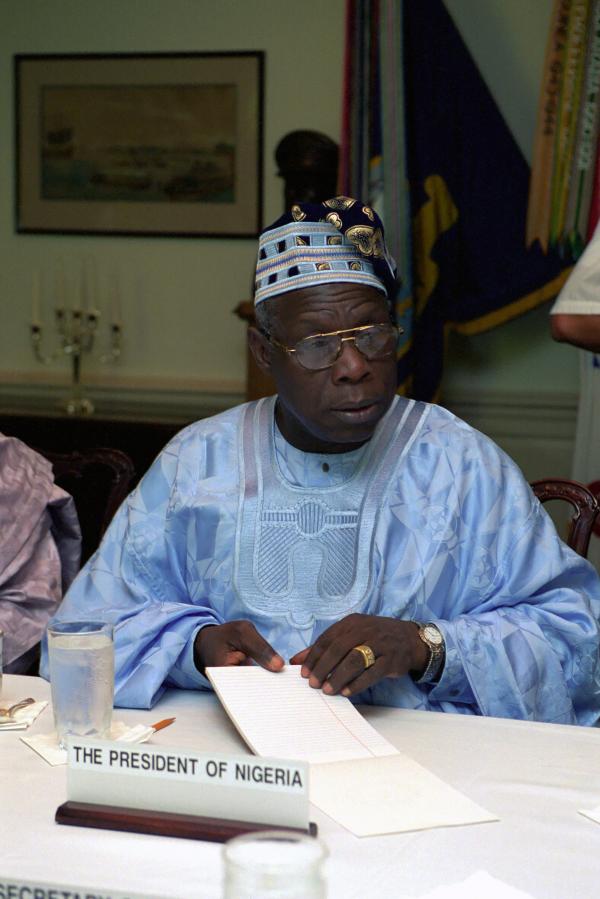
Olusegun Obasanjo took power in 1976 in a military coup but led a first transition back to democracy in 1979. He was elected in 1999 as president in a third, more successful transition. Above, shown in 2001, on a visit to the United States. Public Domain.
Despite General Abacha’s severe rule, opposition groups coalesced in the National Democratic Coalition (NDC). The NDC worked with the trade union federation and environmental groups to build domestic and international pressure on the regime to transition again to civilian rule. When Abacha died in June 1998, a military successor freed political prisoners and implemented a new constitution based on the one adopted under Olusegun Obasanjo in 1979.
In elections held in February 1999, Obasanjo ran for the presidency again and won by a large margin. Obasanjo won re-election in 2003 with 62 percent of the vote. Each time, Obasanjo defeated Muhammadu Buhari, the former dictator. He had returned to politics as a civilian leader heading the new All Nigeria People's Party (ANPP). In each parliamentary election, Obasanjo’s party, the People's Democratic Party (PDP), representing central and southern regions, won majorities against Buhari’s ANPP, whose base was in the north.
Under Olusegun Obasanjo, Nigeria moved in the direction of a more stable democracy. Many freedoms were restored. Independent media and NGO sectors thrived. The economy improved and Nigeria was the first African country to fully repay its debt to the Paris Club of creditor nations. Obasanjo’s record, however, was marred by continued corruption and an inability address an armed insurgency in the Niger Delta as well as other ethnic, religious and communal violence.
Still a Rocky Road
Nigeria’s road to democracy continued to be rocky. Obasanjo tried to amend the constitution to allow him a third term. When that failed, he used control over the electoral commission to rig the 2007 presidential election in favor of a hand-picked candidate.
Nigeria’s road to democracy continued to be rocky. Obasanjo tried to amend the constitution to allow him a third term. When that failed, he used control over the electoral commission to rig the 2007 presidential election in favor of a hand-picked candidate who defeated Buhari of the ANPP, running a third time. The margin was an implausible 51 percent of the vote (69 percent to 18 percent). In parliamentary elections, Obasanjo’s PDP obtained similarly inflated totals. International observers reported fraud and unfair conditions.
Obasanjo’s successor died in mid-term in late 2009. Under the constitution, he was succeeded by Vice President Goodluck Jonathan. His first actions brought renewed hope for a return to a more democratic path. He appointed a new chairman of the Independent National Electoral Commission (INEC) to address charges of fraud in the prior election. He also appointed new heads of security agencies in response to complaints of police and military brutality.
Jonathan won the presidential election in 2011 by a smaller margin (59 to 32 percent) and his PDP won a slim majority in parliament. International observers reported improved electoral practices. In Jonathan’s full term, Nigeria saw further gains in the economy and success in regaining control over the Niger Delta from separatists. But corruption remained high. Jonathan’s popularity declined more with a worsening security environment due to the rise of the extremist Islamist terror group Boko Haram (see also Freedom of Religion below), operating mostly in the north.
In elections held in 2015, Muhammadu Buhari defeated Jonathon with 54 percent of the vote. . . . For the first time in Nigeria’s history, a peaceful transfer of power occurred between political parties through elections.
In elections held in 2015, Muhammadu Buhari defeated Jonathon with 54 percent of the vote. In his fourth bid for the office, Buhari pledged to end Nigeria’s endemic corruption and suppress Boko Haram — a platform that won support in his native north and in the south. Buhari’s expanded party coalition, the All-Progressives’ Congress, gained a large majority in both the House of Representatives and Senate. International observers deemed the elections free and fair. For the first time in Nigeria’s history, a peaceful transfer of power occurred between political parties through elections.
To address corruption, Buhari ordered all national projects suspended pending review of all contracts. The review revealed the scale of corruption. A former national security adviser was arrested in relation to a reported $2.1 billion in funds siphoned from the military. In October 2015, the former oil minister and the chairman of a Nigerian oil company were arrested on charges of corruption and money laundering. The central bank governor testified that from $10 to 21 billion dollars had disappeared “from activities related to the oil industry” — the source of 80 percent of all government revenues.
In regards to President Buhari’s second pledge to suppress Boko Haram and other extremist religious violence, see “A New Government Responds” below in Freedom of Religion as well as Current Issues.
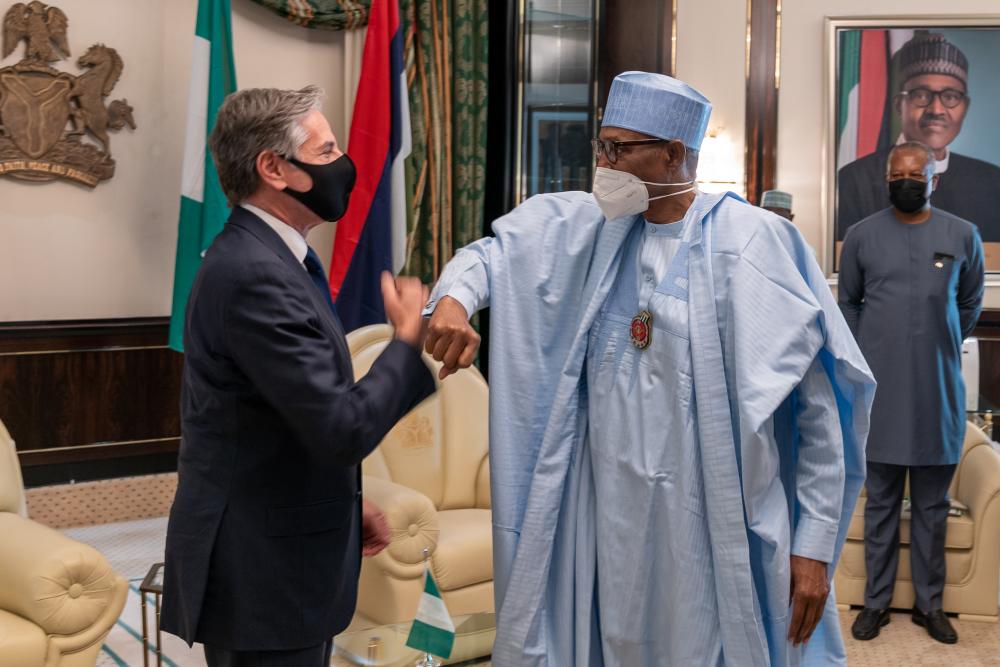
Muhammadu Buhari, in his fourth bid for the presidency, defeated Goodluck Jonathan in 2015 to achieve the first peaceful transition of power between parties in Nigerian history. He won a second term in 2019, Above, he meets with US Secretary of State Anthony Blinken on a trip to Nigeria in November 2021. Public Domain.
Freedom of Religion
As in European countries, religion played an important role in Nigeria’s history. Its early kingdoms and territories practicing traditional beliefs fused governing authority with religious authority, as did later northern kingdoms practicing Islam. British colonial rule allowed administration of Islamic religious law in the north but prohibited extreme punishments allowed under Sharia law. British rule also had general tolerance for traditional practices in the south but also highly encouraged Christian missionary efforts. When Nigeria won independence, a federal constitution guaranteed freedom of religion and the separation of church and state in recognition of the country’s indigenous, Christian and Muslim communities and their intermixture in northern, central and southern regions.
As in European countries, religion played an important role in Nigeria’s history. Its early kingdoms and territories practicing traditional beliefs fused governing authority with religious authority, as did later northern kingdoms practicing Islam.
Religion also played a distinct role in Nigeria’s dictatorships. The northern-based military leader Colonel Gowon, who himself was not religiously affiliated, repressed the Christian-dominant Igbo community after defeating the Biafran bid for independence. General Ibrahim Babangida in the mid-1980s made Nigeria a full member of the Organization of the Islamic Conference, which sparked protests against state identification with a single religion.
In general, democratically elected governments have protected freedom of religion for all communities. But the adoption of Sharia law by twelve northern states since 2000 is seen by non-Muslim residents as restricting religious freedom. More significantly, extremist and violent Islamic groups seeking to impose a caliphate or religious state have instituted a regime of terror, especially in the northern region. The situation is compounded by the often brutal actions taken against violent attacks by police and security forces. At stake are Nigeria’s political and economic stability and its hard-won democracy. A more detailed history follows.
Before Independence: A History of State Religion
Nigeria had a long history of state-dominant religion. In the south, kingdoms based on traditional indigenous beliefs often joined the roles of religious leader and temporal ruler. With the spread of Islam in the north in the 11th century, religion and governance were also fused.
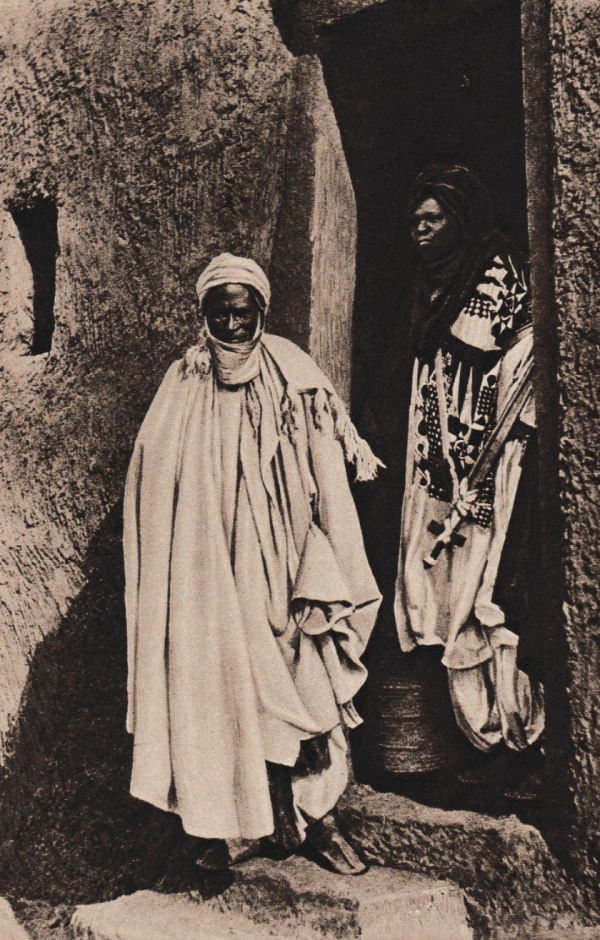
Muhammadu Attahiru II, one of the later Sultans of the Sokoto Caliphate. The caliphate came under British colonial rule in the early 20th century. Public Domain.
The most influential religious figure was an ethnic Fulani Muslim scholar, Usman dan Fodio. At the beginning of the 19th century, he organized an army to conquer the ethnic Hausa states and took over northern territories. He declared his own caliphate, imposed Sharia law for Muslims and non-Muslims alike, and exercised control over surrounding emirates.
The Sokoto Caliphate remained intact until Britain gained colonial control over the north in the early 1900s. Under the British practice of indirect rule, Sharia and other local customs and institutions remained, however governors prohibited severe Sharia penalties like death by stoning and amputations. In the south, British administration tolerated practice of indigenous religions but also directly supported largescale Christian missions, including Roman Catholic ones, that provided schooling and other social services.
British economic policies were a significant factor. They left the remote north undeveloped and focused economic development on the south where oil and other resources were discovered. The inattention to the north contributed to significant social disparities among ethnic and religious groups.
Freedom of Religion After Independence
From the outset in 1960, Nigeria’s constitution incorporated the principle of separation of religion and state and declared that religious freedom was protected for both individuals and communities. This was seen as essential given Nigeria's intermixed population: 50 percent Muslim; 40 to 45 percent Christian; and 5 to 10 percent followers of indigenous beliefs. Ethnic and religious groups dominated certain areas (Muslims lived largely in northern territories, Christian and indigenous believers in the south), but there was substantial movement within regions due to internal migration during British rule.
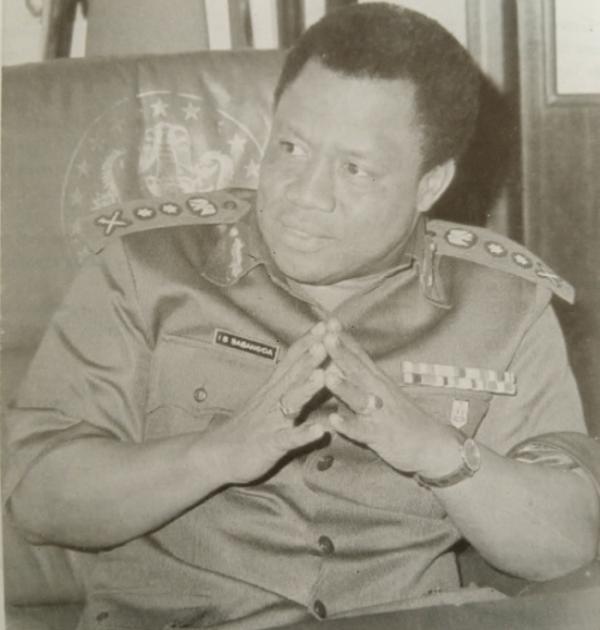
General Ibrahim Babangida, after taking power in a military coup, made Nigeria a full member of the Islamic Conference. The action sparked protests against categorizing Nigeria as a Muslim nation. Public Domain.
Despite federal guarantees, religious freedom was often violated within regions. Religious discrimination was practiced in employment, education, housing, social services and investment. After the 1967–70 war with the Igbo-dominated and largely Catholic Biafra (see History above), the federal military government took over Christian mission schools and expelled foreign missionaries who were accused of supporting separatism.
In 1975, a government Pilgrim Board was established to oversee the Muslim pilgrimage, or hajj, to Mecca, which non-Muslims viewed as state preference in religion. In 1986, General Ibrahim Babangida, a Muslim from the north, made the country a full member of the Organization of the Islamic Conference, a group of Muslim-dominant countries. The action sparked protests against categorizing Nigeria as a Muslim nation and raised fears of Sharia being instituted federally.
The Constitution: Striking a Balance?
The 1999 constitution, like previous charters, was adopted only after much debate on the issue of religion. Some leaders sought adoption of Sharia law on a federal level for all Muslims, while others argued for a fully secular state.
The 1999 constitution, like previous charters, was adopted only after much debate on the issue of religion. Some leaders sought adoption of Sharia law on a federal level for all Muslims, while others argued for a fully secular state. The result was a compromise that left the previous arrangement intact. One section prohibited the national or state governments from adopting any state religion. Another allowed individual states to establish their own courts for those matters uncovered by federal law, which in practice meant Sharia courts of appeal in civil matters. Another provision led to differing interpretations. It states that "every person shall be entitled to freedom of thought, conscience and religion” including “to manifest and propagate his religion or belief in worship, teaching, practice and observance." Religious Muslims consider Sharia law as integral to Islamic "worship, teaching, practice, and observance." Most Christians and secularists argue that Sharia law, if imposed as regular state law, infringes on their own beliefs and practices.
Sharia Reintroduced and Explained
After the restoration of civilian rule, Sharia law advocates asserted themselves at the state level. In 2000, the governor of Zamfara, in the northwest, extended the jurisdiction of Sharia courts to criminal matters. Since President Obasanjo declined to challenge the move, it was followed by eleven other northern states — there are thirty-six states in all — adopting a form of Sharia law in their criminal codes.
After the restoration of civilian rule, Sharia law advocates asserted themselves at the state level. In 2000, the governor of Zamfara, in the northwest, extended the jurisdiction of Sharia courts to criminal matters.
Within Sunni Islam, there are four major schools of Sharia jurisprudence. The Maliki School, considered more flexible than others, is the dominant practice in Nigeria. Still, all four schools adhere, on some level, to punishments for crimes proscribed in the Koran and Hadith (the sayings and practices of Muhammad). These include, for example, amputation for theft. Flexibility is allowed depending on the school of law and circumstances of a crime. (For example, a thief who steals out of dire need might receive leniency.)
Defendants tried within state Sharia courts retain rights under the national constitution to appeal to federal courts, which sometimes overturn convictions and harsh sentences. Even so, the introduction of Sharia in Muslim-dominant states has fostered serious tensions. In some cases this led to communal violence. The US State Department’s International Freedom of Religion Report in 2015 described the scope of the problem:
Although the jurisdiction of Sharia technically does not apply to non-Muslims in civil and criminal proceedings, certain social mores inspired by Sharia, such as the separation of the sexes in public schools, health care, voting and transportation services affected non-Muslim minorities in the north. Many non-Muslims perceived that they lived under the rule of a Muslim government and often feared reprisals for their religious affiliation.
The Larger Threat to Freedom of Religion
Boko Haram’s founder, Mohammed Yusuf . . . declared it a religious duty of all Muslims to reject heliocentrism, evolution and other widely accepted scientific concepts as anti-Islamic teachings.
The rise of the Boko Haram jihadist terror group posed a much graver challenge to Nigeria’s religious freedom. Boko Haram’s founder, Mohammed Yusuf, demanded universal application of Sharia to non-Muslims. Moreover, he declared it a religious duty of all Muslims to reject heliocentrism, evolution and other widely accepted scientific concepts as anti-Islamic teachings. (The group’s name in the Hausa language means “Western education is sinful.”).
The group first emerged in the northern province of Borno but expanded its territory following sectarian fighting in 2009. After Yusuf was killed escaping police custody, Boko Haram became even more fanatical and violent under a new leader, Abubakar Shekau.
Boko Harem terrorized northern regions and cities with attacks on government, civilian and religious targets. A high proportion of its attacks were directed at “apostate” Muslims, including two of Nigeria’s most respected Muslim clerics. Boko Haram also killed 25 people in an attack on a UN headquarters and targeted Christian schools.
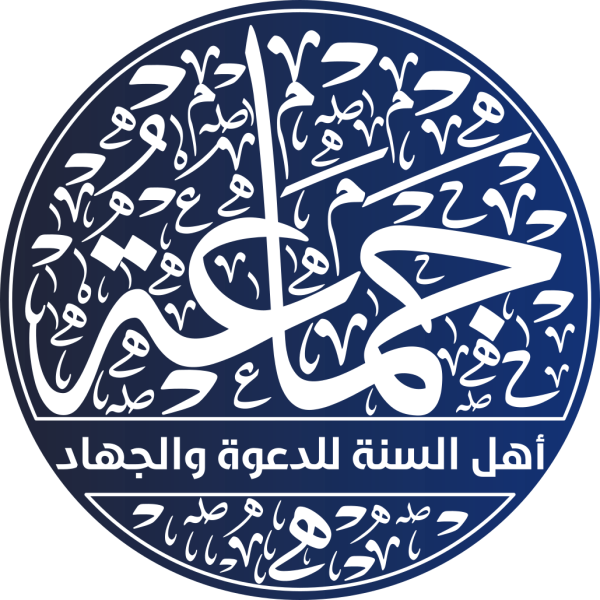
The rise of the Boko Haram terrorist group has posed a grave challenge to Nigeria’s religious freedom. Above, its insignia with the group’s name, which in the Hausa language means “Western education is sinful.” Public Domain.
In April 2014, Boko Haram sparked an international outcry when it abducted around three hundred girls from a school in a northern village. Nearly a hundred escaped but the rest were forced into sexual bondage as wives to Boko Haram militants. After the abduction, the group carried out a spree of kidnappings and vicious attacks and bombings against villages allowing the education of girls, together with other targets and police and army units. In 2014,alone, Boko Haram’s attacks were responsible for a total of 6,664 deaths.
Police and security forces compounded the security problem by responding indiscriminately to Boko Haram attacks. Government security tactics included sweep searches, mass arrests, torture, extrajudicial killings and constant harassment and intimidation of communities suspected of harboring militants.
A New Government Responds
When Muhammadu Buhari took office in May 2015 (see History above), he pledged both to suppress Boko Haram and restrain the police and military from excesses. He fired two heads of military services and other top security officials. He then moved the military’s headquarters to the northern capital of Borno, the largest state under attack, to begin a counterinsurgency campaign against Boko Haram. A Multinational Joint Military Task Force spearheaded by the president of Chad assisted the effort.
When Muhammadu Buhari took office in May 2015 . . . he pledged both to suppress Boko Haram and restrain the police and military from excesses.
The military campaign retook a number of towns and villages under Boko Haram’s control and by December 2015, President Buhari declared the defeat of Boko Haram. The claim was premature. The group still held significant territory and continued to mount terrorist attacks on a regular basis in both the north and south. In a new tactic, Boko Haram began deploying women and children wearing suicide bomb vests to carry out the attacks. At the end of 2015, it was estimated that 2 million people had been displaced and 15,000 people killed from the overall conflict. The terror group also continued abducting schoolchildren. Human Rights Watch reported at least 1,600 such abductions overall since 2014. As a result, state governments have not been able to create a secure environment for education, reducing school attendance.
In 2015, a group called the Islamic State West Africa Province (ISWAP) splintered off from Boko Haram as a more faithful affiliate of the Islamic State in Iraq and Syria (ISIS). It targeted international aid workers, military bases and local government officials and communities. Another group, the Islamic Movement of Nigeria, a Shi’ite group, clashed with security forces in Abuja, the capital.
Current Issues
Nigeria continues to struggle to overcome the legacy of its colonial and dictatorial past, economic challenges, and the newer threats of extremist religious-based violence. Since 2015, there have been two further national elections in Nigeria. Neither, however, met the standards reached in the 2015 election.
Nigeria continues to struggle to overcome the legacy of its colonial and dictatorial past, economic challenges, and the newer threats of extremist religious-based violence.
President Muhammadu Buhari won reelection in February 2019 with 53 percent of the vote. His opponent, Atiku Abubakar, who succeeded Olusegun Obasanjo as leader of the People’s Democratic Party (see History above) received 39 percent. Several other candidates won small percentages of the vote. In parliamentary elections held at the same time, Buhari’s All Progressives Congress won large majorities in the House of Representatives (212 of 350 seats) and the Senate (63 or 109 seats). Abubakar’s PDP gained 138 seats in the House and 45 in the Senate. Eight other parties won the remainder of House and Senate seats.
The election was again controversial. On the morning when voting was set to begin, the Independent National Electoral Commission (INEC) announced a one-week delay due to security concerns resulting from terrorist threats. As a result, turnout was a record-low 35.7 percent. International observers reported election-related violence, vote buying and intimidation of voters. The INEC, however, rejected claims of substantial fraud and verified the election results. The Supreme Court dismissed Atiku Abubakar’s appeal that October.
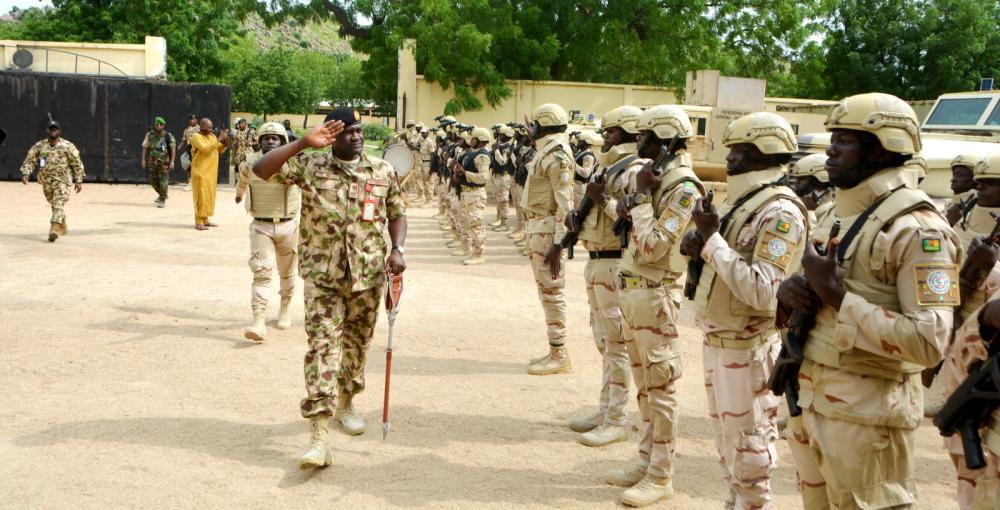
Military operations are ongoing against Boko Haram and ISWAP, which continue to organize terrorist attacks as well as abductions of schoolchildren, mostly girls. Above, a unit being inspected by its commander. Public Domain License. Creative Commons.
In his second term, Buhari continued to face serious economic and security challenges. While for a time Nigeria became Africa’s leading economy in Gross Domestic Product (it has fallen to third), there remained large levels of income inequality. Boko Haram and a splinter group, the Islamic State West Africa Province (ISWAP), continued terror attacks throughout Nigeria and still controlled swaths of territory in northern provinces.
In 2021, Boko Haram’s leader, Abubakar Shekau, committed suicide after being captured by ISWAP. There followed major defections of Boko Haram leaders and fighters to ISWAP as well as surrenders of substantial numbers of fighters to federal authorities. During Shekau’s leadership, Boko Haram was responsible for more than 30,000 deaths and 1,600 kidnappings of schoolchildren, mainly girls, according to both human rights and government reports. Boko Haram is still active but ISWAP has surpassed it as Nigeria’s major terrorist group and threat. It has launched numerous terror attacks on civilian and government targets, including a military base in Borno state.
The violence and intolerance of terror groups has had profound impacts. The attacks by Boko Haram and ISWAP on secular schools, their kidnappings of schoolgirls and their terrorist attacks on civilian communities have resulted in the destruction or closure of thousands of primary, secondary and tertiary schools.
The violence and intolerance of terror groups has had profound impacts. The attacks by Boko Haram and ISWAP on secular schools, their kidnappings of schoolgirls and their terrorist attacks on civilian communities have resulted in the destruction or closure of thousands of primary, secondary and tertiary schools. As a result of the violence, the UN Children’s Fund (UNICEF) reported that three million children in the north had no access to education. Some of the problem is attributable to the government’s security response. According to Human Rights Watch, the military had detained thousands of children suspected of supporting Boko Haram or ISWAP.
The ongoing challenges facing Nigeria led to a spirited election campaign in 2023, including the rise of a surprisingly strong third party bid. The electoral system for the presidential contest requires a plurality vote (described as a “qualified majority”) but also requires a minimum of 25 percent vote in 24 of 36 states, thereby ensuring a national base of support.
The constitution’s two-term barred Buhari from running again. The All Progressives Congress candidate was a veteran party and government leader, Bola Tinubu. In the February balloting, Tinubu won a 37 percent plurality against Atiku Abubakar, again the PDP candidate, with 29 percent. Peter Obi, the candidate of the new Labour Party, had 25 percent of the vote.
But again there were significant irregularities, including violence, allegations of vote rigging and voter suppression, and technical difficulties at a number of polling places. General violence as well as general public dissatisfaction resulted in a record-low 27 percent turnout. Both domestic and international observers reported concerns with the transparency of the Independent National Electoral Commission (INEC). The losing candidates, Abubakar and Obi, challenged the election outcome, but it was upheld by an election tribunal in September. Nigeria’s Supreme Court affirmed the election tribunal’s ruling.
While Nigeria is considered an electoral democracy, Freedom House ranks it in the Partly Free category for its large deficits in governance, electoral practices, judicial independence, corruption and economic disparities. But Nigeria’s civil society and multiparty system remain a basis for democratic hope.
Like his predecessor, Bola Tinubu began his presidency trying to address corruption and abuse of power. He suspended the head of the Economic and Financial Crimes Commission and removed the head of the central bank, who was arrested on corruption-related charges. At the same time, Tinubu undertook controversial economic policies, including ending oil and gas subsidies. This compounded high inflation from the pandemic period and led to a drastic reduction in living standards. By mid-2024, Tinubu had lost much of his support and faced a growing economic and political crisis (see New York Times article in Resources).
While Nigeria is considered an electoral democracy, Freedom House ranks it in the Partly Free category for its large deficits in governance, electoral practices, judicial independence, corruption and economic disparities. But Nigeria’s civil society and multiparty system remain a basis for democratic hope.
The content on this page was last updated on .
